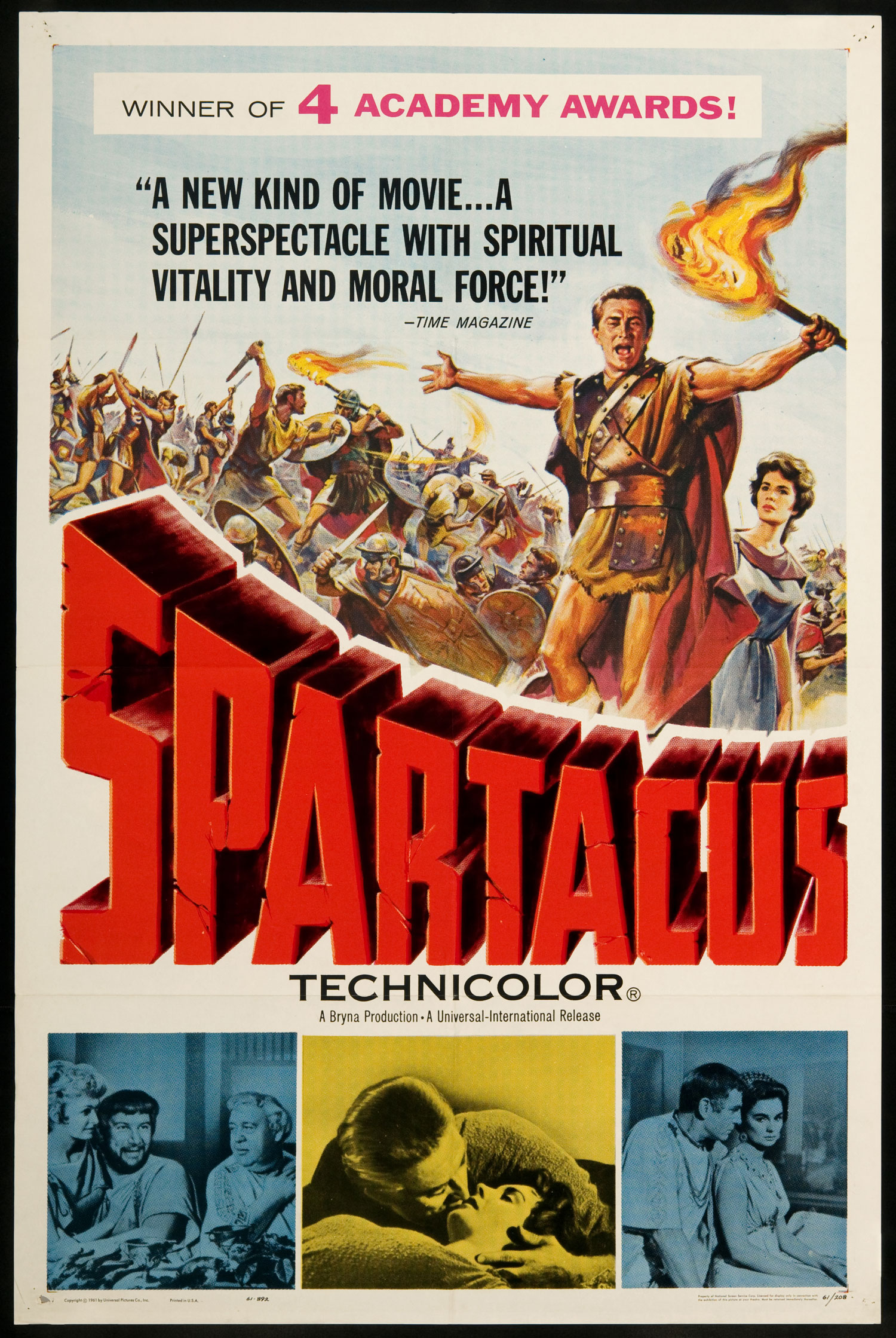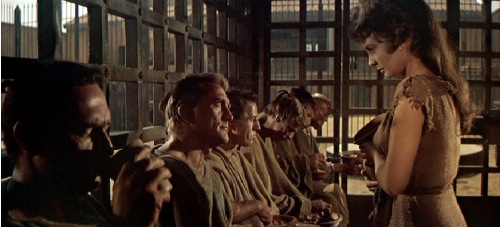Summary
A slave, Spartacus, leads a rebellion of thousands of slaves across Italy, threatening the power of the Roman Empire.
An Epic Moment
I love an Epic. This one is no exception. “Spartacus” is one of a few films I cannot remember ever not knowing. To me however, it was always that ‘other’ roman epic, the first being "Ben Hur.”
However, it is still a film which means a lot to me, mostly for a lesson I was taught through it, in high school, by my history teacher, Richard Mondoux.
There is a famous scene in this film where Crassus (Laurence Olivier, “Rebecca”), speaking to Antoninus (Tony Curtis, “Some Like It Hot”), his personal slave, waxes on about his taste for oysters and snails. To any adult, the conversation is clearly about the fact that Crassus enjoys the company of both men and women but that was lost on me, and adolescent with all the attention span of a teenager sitting in a room with cute girls.
After this scene played, Mr. Mondoux paused it and explained the meaning of the scene and for the first time, I heard someone put into words the idea that the most important thing being said is not always what is being spoken but what is being implied. In words I would later learn, subtext is more important than text. Because of this explanation, I can actually pinpoint in my memory the moment when I started reading books, says, and films with the eyes of an adult. Not always well or accurately but the seed had been planted just as I was about to water it with hundreds of movies, books, TV shows, albums, and comic books.
On a side note, I also have Mr. Mondoux to thank for showing me “Ran,” one of my favorite movies ever, for the first time.
Theme
One of my favorite things about Epics is their simplicity. The plot of “Ben Hur,” “Seven Samurai,” and “Lawrence of Arabia,” are all very simple. What is epic about them is the way they are shot and the way that every aspect of a single, simple story is shown, so that the simple is seen for what it is, multi-faceted.
Spartacus is no exception. The simple story of slave uprising could be told in an hour and a half, but this film is interested in more than just battle scenes. In fact, I would hesitate to even call this an action movie. There are really only a few fight scenes. The majority of the film is spent in senate chambers, politicians households, and in ramshackle tents thrown together by slaves on the run.
One might expect the story of gladiator escape to be full of gruesome battles and glorious blood soaked victories but there is only one gladiatorial contest ever shown on screen and only two are even spoken of. The first is only ever heard through the closed door of a holding pen and the second, Spartacus actually loses, a twist of fate being the only measure that saves his life. Doesn’t Kubrick understand what a movie like this should be about?
Of course he does. That’s why it isn’t full of action scenes. Because this movie is about man, power, slavery, and domination. It is a statement against despotism, factionalism, and machiavellian politics. It’s a statement of solidarity with unions, black listed actors, the downtrodden, and oppressed. It reminds the viewer that while the dominating forces of this world may have the power, law, and structures of the world to support them, the working man, the slave, and the prisoners have numbers on their side if they can only unite.
Photography
While it isn’t his most stunning work, Kubrick is finally given the budget and stars he needs to stretch his cinematic legs. I was surprised when I found out this was a Kubrick film in film school because it seems so standard. Many of the scenes I would say don’t look as good as the scenes in my preferred Epic, “Ben Hur” but once I knew it was his, it was obvious. How could I not have noticed it before.
There are a few scenes which I think are the most obvious examples of Kubrick’s style being let loose.
The first is the scene in which Spartacus awaits his first gladiatorial contest with his opponent, Draba (Woody Strode, “The Ten Commandments”). Spartacus has never fought before and probably not even seen a fight before. He’s practiced, sure, but as he stares at Draba and hears the battle clashes of sword and shield elicits grunts and cries from his friend who is fighting for his life in the arena, Kubrick chooses to only give us shots of Draba and Spartacus; none of the battle outside the door. Kubrick wants us to focus on Spartacus and what he must be thinking, fearing and steeling himself for the fight to come. As Crixus (John Ireland, “All the Kings Men”), Spartacus’ friend returns to the holding pen and his opponent is dragged off, dead, we realize that the fight doesn’t matter. The only thing that matters is the outcome. Spartacus realizes this just as the audience does.
The next seen which shows Kubrick’s talent is the very next one in which Spartacus and Draba fight to death for the entertainment of four Roman Aristocrats. During the fight, Kubrick gives us a long shot of the four, discussing political matters and scheming, all the while in the background, the two gladiators fight for their lives. The Romans hardly seem interested in the fight they themselves demanded to see at great expense.
It highlights how little the lives of these men mean to the Romans. Their lives and deaths barely interest them. In fact, when the winner Draba, instead of killing Spartacus hurls his trident at Crassus and attempts to climb up to him in attack, Crassus kills him with such a simple, almost absent minded stroke, that it seems more like he was putting down an injured animal than a man. This attitude toward the lives of the slaves is the driving force of the film and Kubrick makes sure that even the action scenes contribute to the unfolding of that theme.
The Players
I’d love to say that I thought Kirk Douglas was great as Spartacus but he’s an actor that has never really done it for me. Jean Simmons (“Guys and Dolls”) is in a similar boat for me but I do appreciate that in casting this movie they relied on men and women who were of proper age for the roles. You don’t have to imagine what they would do to this story if they remade it. You have only to watch the series on STARS, though I would not recommend it.
The rest of the cast, however, is fantastic. This really is the definition of a star studded cast. Even though Douglas and Simmons aren’t my favorite their star power is undeniable. Add to that Charles Laughton (“Mutiny on the Bounty”), Tony Curtis, and Laurence effing Olivier, there just isn’t much else you could ask for.
This film also has one of my all time favorite actors, Peter Ustinov, in one of his most iconic roles as Batiatus. His whimpering low level aristocracy is as dripping servile sniveling to those above him as it is full of pompous dictatorship over those beneath him.
He’s long been a personal favorite of mine from his role as Nero in “Quo Vadis,” (though most will know him best as Prince John from Disney’s "Robin Hood”) but I had forgotten he was in this film as well. I was delighted to find myself laughing with his wry performance, even as he makes one of the smaller yet important redemption arcs over the course of the film.
Verdict
If one is coming to this film after seeing the STARZ TV Series, I imagine the disappointment would be profound. The battles are few and and short in comparison. The sex, non existent.
However, if one comes to this film to see a dramatic slave story, an epic in terms of its social commentary, then I am sure anyone could find plenty in this film to make it an instant classic in their own eyes.
Perhaps not the most “Kubrickian” film, it is nevertheless a classic example of Hollywood’s ability to make epics that both excites the child in us who longs for battle and hero worship, as well as touches the heart of the adult in us who craves strength of will and character over body.
Review Written By:








